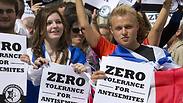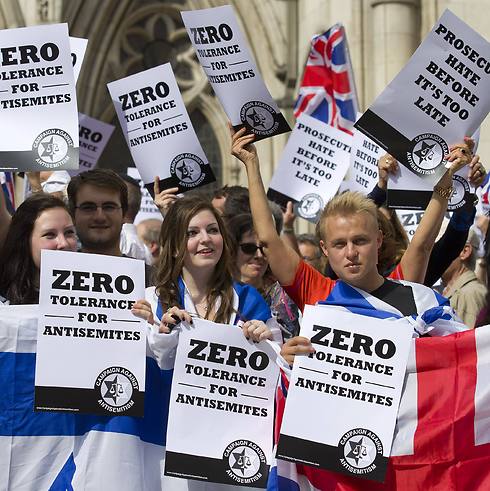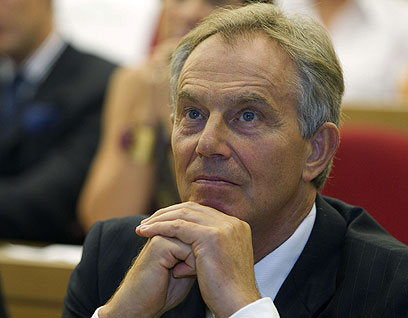
EU official: ‘Huge challenge’ to reassure Jews
European Commission Vice-President says that following Paris attacks, 'majority of Jewish community in member states is not sure that they have a future in Europe'.
The EU faces a “huge challenge” to reassure Jews about their future in Europe after Islamist attacks in Paris, a top official said earlier this week as it discussed fresh counter-terror measures. European Commission First Vice President Frans Timmermans said the 28-nation bloc was determined to respond in keeping with its core values of tolerance and inclusion, promising a new strategy would be ready by May.
“Today we see in some of our member states that a majority of the Jewish community is not sure that they have a future in Europe,” he said. “I think this is a huge challenge to the very foundation of European integration,” he added.
He said the issue was more important than the single European currency or internal markets or other initiatives.
Timmermans said Europeans must use education and other tools “to make sure that we don’t lose part of our population to extremism, to fanaticism, to exclusion.”
“Whether they are Jewish, Muslim, Christian or atheist, everybody has a place in this society,” he added.
Timmermans said the Commission, the EU’s executive arm, would work especially hard to meet European Parliament concerns over data protection which have held up agreement on an air passenger tracking system. The Commission will do everything to develop a “strategy that offers hope and prospects for everyone in Europe,” he said.
Many member states back use of the Passenger Name Record system as an essential tool to track suspected “foreign fighters” but lawmakers have held up an EU-wide system for years.
Timmermans said the Commission would “see if we can change our proposal to meet these concerns,” stressing that Europe had to been seen as “taking its job seriously” in countering the militant threat. At the same time, security remained the responsibility of member states and the European Union’s role was to “assist them, support them so that jointly they can (meet) that responsibility.”
Europe’s greatest fear is that disaffected citizens who go to fight with extremist groups such as the Islamic State group in Syria or Iraq and return home even more radicalized and battle hardened. Timmermans raised the possibility that the EU could look at tightening up its Schengen passport-free system so as to boost checks on its external border to pick up militants.
Asked about possible intelligence sharing, Timmermans said member states appeared more confident on the issue but also cited “some obstacles” without detailing them. Most EU states have been reluctant to open up their intelligence networks to anyone except their most trusted allies for fear of harmful leaks.
'Extremism is nothing new'
Meanwhile in Davos, Switzerland an unusual panel on religion at the World Economic Forum took place on Wednesday .
In a wide-ranging debate that took in conflicts in the Middle East, Nigeria, Central African Republic as well as the recent Paris attacks, the panel all agreed on one unfortunate fact: there’s nothing new under the sun.
“Extremism is nothing new. We had extremism in the 20th century through Communism, through Fascism, both of which were ideologies that were profoundly anti-religion,” said Tony Blair, a committed Christian, who is now a Middle East peace envoy.
“It’s not religion per se that were causes of conflict. However, today, the ideology that is most threatening our security is an ideology based on a perversion of religion,” added Blair, referring to radical Islam.
Hamza Yusuf Hanson, a top Islamic scholar, agreed that radical Islam was what he called a “perversion,” arguing that traditional Islam was “one of the exceptional religious movements that allowed other religions to live peacefully among them.”
And Rabbi David Rosen, from the American Jewish Committee, said religion was being skewed to manipulate people, in a downward spiral that leads inevitably to violence. “When we feel threatened, it’s natural and desirable to turn to religion,” he said.
This then leads to a them-against-us mentality as “people actually believe that they are doing what God wants”, he said.
The religious leaders also found common ground when discussing the limits of freedom of expression in the wake of the Charlie Hebdo killings in Paris earlier this month. Islamist gunmen killed 12 people in and around the offices of the French satirical magazine, claiming “revenge” for the publication of cartoons of the prophet Mohammed, which most Muslims find blasphemous.
After the shooting, Charlie Hebdo again published a cartoon featuring Mohammed, which sparked anger and riots in many Muslim countries, some turning deadly.
Muslim representative Hanson voiced the strongest objections to the prophet’s depiction. The publication of the cartoons was an “absolute lack of civility and common decency”, he said. “You can condemn and criticize religion ... all those things are fine but you can’t mock and disrespect people,” he added.
“Radicalization is very easy when you mock what people hold dear,” Hanson pointed out.
Meanwhile, Rosen told AFP that insulting people’s religion was in many ways worse than insulting them racially.
“I think it’s very interesting that President Francois Hollande said that those burning the French flag (in recent anti-Charlie Hebdo protests) should be punished, so he does acknowledge there are limits to freedom of expression,” he said in an interview. “I think people need to be more responsible.”
Education is the answer
Blair argued that the only long-term solution for the problem of religion being perverted into violence was education.
“This extremism is not natural, it’s taught and its learned and you have to unteach it in the school systems,” he said.
Meanwhile, Archbishop Thabo Cecil Makgoba, from South Africa, said that “as a man of faith, I cannot give up hope” and urged the assembled elites to keep the problem of violence and religion in perspective. “Of the six billion people in the world, only a handful are terrorists, so let us not be terrified by this tiny minority,” he said. “Freedom and love are key values and if we stick to that, we can transcend violence.”
The World Economic Forum in the picture-postcard Swiss ski resort of Davos brings together some 2,500 of the biggest movers and shakers in the world of finance and politics and runs until Saturday.












